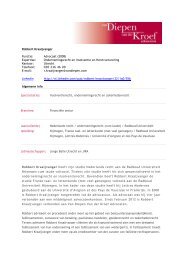© Van Diepen Van der Kroef Advocaten
© Van Diepen Van der Kroef Advocaten
© Van Diepen Van der Kroef Advocaten
- No tags were found...
Create successful ePaper yourself
Turn your PDF publications into a flip-book with our unique Google optimized e-Paper software.
have any consequences for the validity of the writ of summons. After all, the process serverwho served the writ of summons on the UN saw no (possible) conflict with the internationalobligations of the State of the Netherlands, any more than the Minister issued anydeclaration to the process server. As follows also from the Memorandum of Explanation toArticle 3a (TK verga<strong>der</strong>jaar 1992-1993, 23 081, number 3, page 4) cited by the State of theNetherlands, the writ of summons was validly served and it thus remains so.31. Article 3a Bailiffs Act deals besides in particular with international obligations that relate (incontrast to the present proceedings) to the immunity of foreign states (see Memorandum ofExplanation to Article 3a, TK (Second Chamber) Assembly Year 1992-1993, 23 081, number3, page 1):‘For several years there has been renewed interest in the question how to preventembarrassment to the State of the Netherlands by civil proceedings being brought in theNetherlands against another state or attachment being levied on its property in a situationwhere such would be in breach of the international obligation of the State.’(…)‘In discussing this problematic there is a case to be made for the drawing of a distinctionbetween, on the one hand, the question whether, and, if yes, to what extent immunityfrom jurisdiction in the Netherlands attaches to the foreign power, and, on the other, thequestion whether, and, if yes, to what extent such an immunity also attaches in the area ofthe enforcement of judgments.’32. The process server correctly judged that no situation arose covered by Article 3a of theBailiffs Act. Consequently, it is for the Court to consi<strong>der</strong> whether it has jurisdiction. Thelegal interest raised by the viewpoint of the State of the Netherlands has already beensufficiently addressed by the Public Prosecutor’s Department un<strong>der</strong> Article 44 CCPr, prior tothe grant of leave to proceed in default of appearance.33. The State of the Netherlands has stated that it has sufficient interest in the motions. Tothat end the State of the Netherlands referred to the Bailiffs Act. The Association et al. hasdemonstrated the incorrectness of the arguments of the State of the Netherlands and has<strong>©</strong> <strong>Van</strong> <strong>Diepen</strong> <strong>Van</strong> <strong>der</strong> <strong>Kroef</strong> <strong>Advocaten</strong> page 14 of 99
















